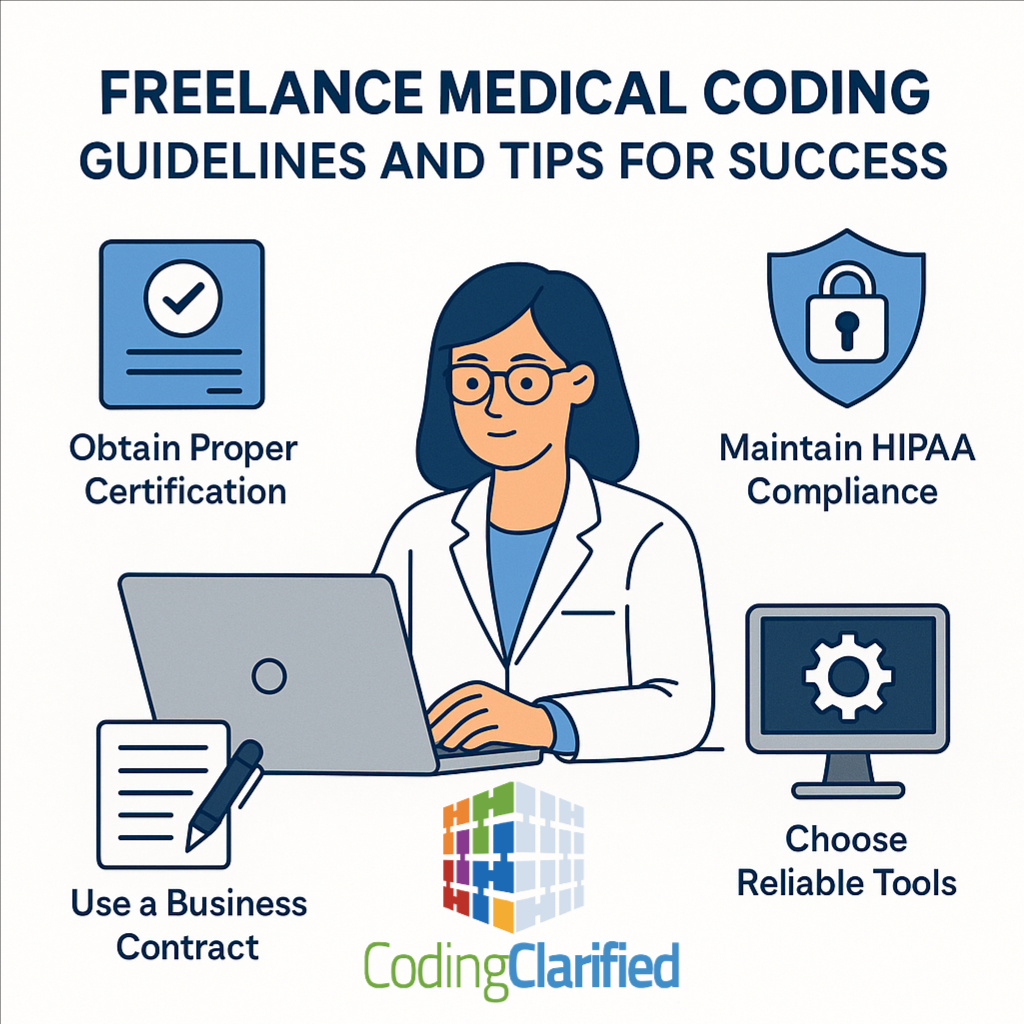Freelance Medical Coding: Guidelines and Tips for Success
Freelance medical coding offers certified coders flexibility, independence, and the ability to work from home while still applying their expertise in healthcare documentation. As the demand for remote coding continues to grow, more coders are transitioning from traditional employment to self-employment. However, success as a freelance medical coder requires planning, professionalism, and strong business skills.
Understanding Freelance Medical Coding
Freelance medical coders work as independent contractors rather than employees. They may contract directly with providers, facilities, billing companies, or coding vendors to assign CPT®, HCPCS, and ICD-10-CM/PCS codes for medical records.
Because freelancers manage their own business operations, they are responsible for taxes, client contracts, and maintaining compliance with HIPAA and other healthcare regulations.
Key Guidelines for Freelance Medical Coders
1. Obtain Proper Certification
Most clients require certification from an organization like the AAPC (such as CPC®, COC®, or CRC®) or AHIMA (such as CCS®). Credentials validate your expertise and build trust with potential clients.
2. Maintain HIPAA Compliance
As an independent contractor, you are still bound by HIPAA. Always use encrypted email, secure Wi-Fi, password-protected devices, and avoid storing PHI (Protected Health Information) on unprotected systems.
3. Use a Business Contract
A clear, written contract protects both you and the client. It should define:
-
Project scope and deadlines
-
Pay rate and payment schedule
-
Confidentiality and HIPAA compliance clauses
-
Ownership of coded data
4. Understand Tax Obligations
Freelancers are considered self-employed, so you’ll need to file quarterly estimated taxes and maintain records for deductions such as home office expenses, certification fees, and software subscriptions.
5. Choose Reliable Tools
Invest in:
-
Medical coding software (such as AAPC Coder or EncoderPro) AAPC Codify
-
Secure communication and document-sharing tools (like HIPAA-compliant email or portals) HIPAA
-
Accounting and invoicing systems to manage client payments
Tips for Building a Successful Freelance Coding Career
1. Start Small
Begin by taking on smaller contracts to build your reputation. As you gain experience, you can increase your rates and client load.
2. Network Constantly
Join coding groups, LinkedIn communities, and local AAPC chapters to find contract opportunities. Word-of-mouth referrals remain one of the most effective ways to secure freelance work. Networking For Medical Coders
3. Keep Learning
Stay current with ICD-10-CM, CPT®, and HCPCS updates, and consider adding specialties such as HCC risk adjustment or E/M auditing to expand your skill set.
4. Deliver Quality and Accuracy
Clients value coders who code quickly and precisely. Always double-check your work and adhere to payer guidelines to avoid denials or compliance issues.
5. Build a Professional Brand
Create a professional resume, LinkedIn profile, and possibly a personal website to showcase your certifications, experience, and specialties. Consistent branding builds client trust and credibility.
Freelance medical coding can be a rewarding and profitable career path for certified coders who value flexibility and autonomy. By maintaining compliance, delivering quality work, and managing your business professionally, you can build a successful long-term freelance career in the medical coding industry.

